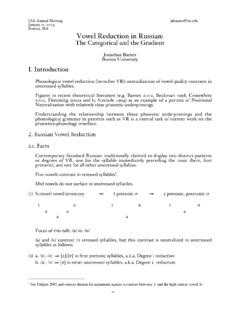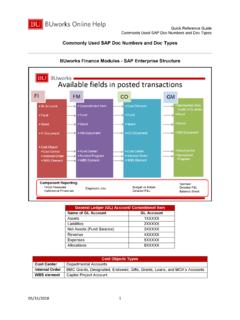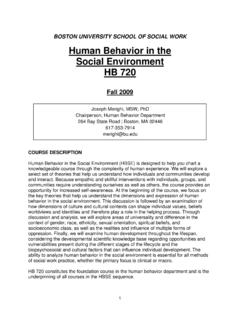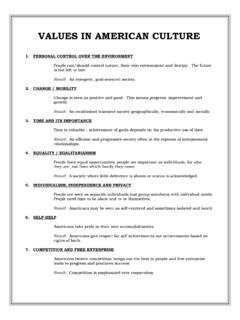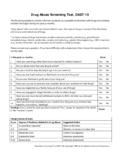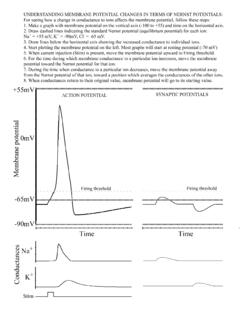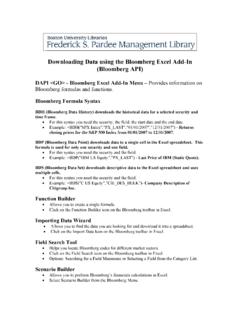Transcription of Parl 07 12 11 Abbrev - bu.edu
1 Are Parliamentary Systems Better? ABSTRACT The institutional differences between presidential and parliamentary rule are well known, yet the practical effects of these divergent constitutional arrangements within democratic polities have received scant attention. This paper employs a global dataset to test the relationship between a historical measure of parliamentary rule and fourteen indicators ranging across three policy areas: political development, economic development, and human development. We find a strong relationship between parliamentarism and good governance, particularly in the latter two policy areas. To the extent that these institutions influence the quality of governance, parliamentary systems may offer advantages over presidential systems of democratic rule. John Gerring Boston University Department of Political Science 232 Bay State Road Boston MA 02215 617-353-2756 Strom C. Thacker Boston University Department of International Relations 152 Bay State Road Boston MA 02215 617-353-7160 Carola Moreno Boston University Department of Economics 270 Bay State Road Boston MA 02215 Keywords: presidentialism, parliamentarism/parliamentary, governance, development, separation of powers 2 The constitutional structure of the executive has been a major research question in political science since the birth of the discipline.
2 Beginning with Walter Bagehot and Woodrow Wilson, scholars of American and European politics have pondered the effect of unified or separated powers on campaigns and elections, on voter behavior, on the behavior of party elites, on the workings of the bureaucracy and the courts, and more generally, on the policymaking process. More recently, the structure of the executive has emerged as an important question within the field of comparative politics, a consequence of the rise of new democratic polities around the world. Thus, many of the same questions that arose initially in comparisons between the United States and the United Kingdom are now being raised in a global context. Underlying much of this work within American and comparative politics is the implicit normative question: are parliamentary or presidential systems superior? Which method of structuring the executive leads to better governance? It is difficult to read the literature on parliamentarism and presidentialism without catching a strong whiff of these underlying normative concerns ( , Haggard & McCubbins 2001; Lijphart 1992; Mainwaring & Shugart 1997; Skach 2005; Wilson & Schramm 1994).
3 And it is right that they should be there, for the practical question facing constitution-makers around the world is one of institutional choice. Taking all possible causal effects into account, which system is preferable? We live in an age of constitutional reform, where core elements of the polity are subjected to continual criticism and not infrequent amendment (Reynolds 2002; Sartori 1994). If political science cannot offer guidance on this matter then the discipline is, in essence, passing the buck. Moreover, this fundamental normative question if answerable may lead to significant theoretical gains for the discipline. It is not simply a question of exigency. Of course, it may be that neither system is better, overall. Conceivably, the only 3 consequential difference between these two constitutional molds is that one system (presidentialism), by virtue of greater institutional fragmentation, offers greater resistance to change (Tsebelis 2000: 443).
4 There may also be as many differences within as between each constitutional type. Indeed, presidentialism and parliamentarism are unified labels for variegated realities (Haggard & McCubbins 2001; Mainwaring 1993; Shugart & Carey 1992; Tsebelis 1995). Alternatively, parliamentarism and presidentialism each may demonstrate varying strengths and weaknesses along different policy dimensions (Weaver & Rockman 1993). Or it could be that the performance of the executive is contingent upon cultural, socioeconomic, and historical factors that vary from country to country and from period to period. If so, parliamentarism may be more appropriate in some contexts, and presidentialism in others. The modal position among political scientists appears to be that the issue is complicated, and no clear and consistent advantage can be found for either executive type. In any case, questions regarding the overall governance impact of these two fundamental constitutional forms seem well worth posing.
5 Without taking a broad cut at these matters we cannot hope to answer the question of whether there might be distinct strengths and weaknesses along different policy dimensions or among different regions of the world or across different time-periods, or whether there is in fact some consistent result that holds across dimensions, measures, regions, and eras. Given its theoretical and normative importance, it is striking that the question of executive organization and its effect on the quality of governance has received so little systematic crossnational empirical analysis. There is, of course, plenty of speculation on these matters, a bit of formal modeling, and quite a number of case studies. In addition, many large-N crossnational studies have been conducted on what might be termed the proximate causal 4 effects of presidentialism and parliamentarism , on electoral behavior, legislative behavior, interbranch relationships, cabinet formation, the operation of the bureaucracy, the policymaking process, the organization of interests within civil society, and the size of the welfare state ( , Samuels 2007).
6 Yet, none of these outcomes has unambiguous ramifications for the quality of governance. Indeed, the only outcome of obvious normative importance that has been subjected to extensive crossnational empirical analysis is the purported affinity between parliamentarism and democracy, a matter about which there seems to be very little scholarly agreement (contrast Cheibub 2007 and Stepan & Skach 1993). Our concern here is with issues of governance internal to democratic polities. That is, given a modicum of multi-party competition, what are the policy effects of different executive structures? This question has scarcely been Granted, a number of writers have tested aggregated models of democratic governance that bring together a number of political institutions into a single variable, , the Consensus model (Lijphart 1999), the Checks index (Beck, Demirguc-Kunt & Levine 2000), the Political Constraints index (Henisz 2000), and the Centripetalism index (Gerring, Thacker & Moreno 2005).
7 Our interest here is more narrowly targeted on the construction of the executive and its possible role in achieving good governance. In attempting to judge this matter we observe three broad policy areas political 1 Foweraker & Landman (2003), whose primary concern is with the quality of democracy in parliamentary and presidential systems, also touch on the provision of property rights across regime types. Although they find no statistically significant difference between them along this dimension of economic policy, the regression analysis relies on a very small sample (N=40) that is potentially biased and subject to a host of possible specification errors (due to the paucity of control variables included in the model and lack of robustness tests). 5 development, economic development, and human development comprising a total of fourteen specific outcomes understood as indicators of good or bad governance across these various dimensions.
8 The first section of the paper presents the theoretical debates surrounding the efficacy of presidential and parliamentary systems. These debates generate the competing hypotheses tested in the empirical section of the paper. The paper concludes with a discussion of the results and implications of the research. THEORETICAL DEBATES The debate over presidentialism and parliamentarism has a long history, and the terms of this debate have changed little over the past century. The debate persists despite the fact that the proximate effects of different executive structures are generally accepted. Ceteris paribus, it is understood that parliamentary systems foster stronger political parties, more centralized and party-aligned interest groups, a more centralized decision-making process, and more centralized and hierarchical administrative structures. These differences are aptly, if somewhat ambiguously, summarized by the concept of veto points (Tsebelis 1995).
9 Separate powers introduce an additional veto point into the political process, fragmenting politics at all levels. The effect of this concentration or dispersion of power is to create a contrast between systems that are decisive and those that are resolute (Cox & McCubbins 2001: 27). Parliamentary systems are decisive, presidential systems resolute. In addition, parliamentarism fosters a style of politics and policymaking that is probably more institutionalized, centered as it is on political parties, while presidentialism fosters a more personalized and free-floating style of leadership centered on individual politicians and smaller, less established organizational entities. Yet, none of these proximate causal effects has clear-cut implications for the quality of governance in a polity. Partisans of separate powers prize the diffusion of power, while 6 parliamentarists prize its unification. Thus, most of the arguments that we review here may be understood as derivative of a single centralist/decentralist dimension.
10 Consider, first, the question of party organization. There is general agreement that the existence of an independently elected executive with strong policymaking prerogatives weakens party cohesion (Shugart 1998). Members of the same party are less likely to vote together in the legislature and party allegiances are weaker in the electorate. But there is intense disagreement over whether strong (cohesive) political parties foster good governance. Supporters of the Responsible Party Government model view strong political parties as the linchpin of democratic accountability and effective governance (APSA 1950). Critics of this ideal point out that undue partisanship may blind voters and legislators to the public interest and may prevent them from reaching compromise. Good public policy, not the interests of a party, should guide behavior in the ballot box and on the floor of the assembly (Herring 1940). Consider, next, the question of interest organization.

